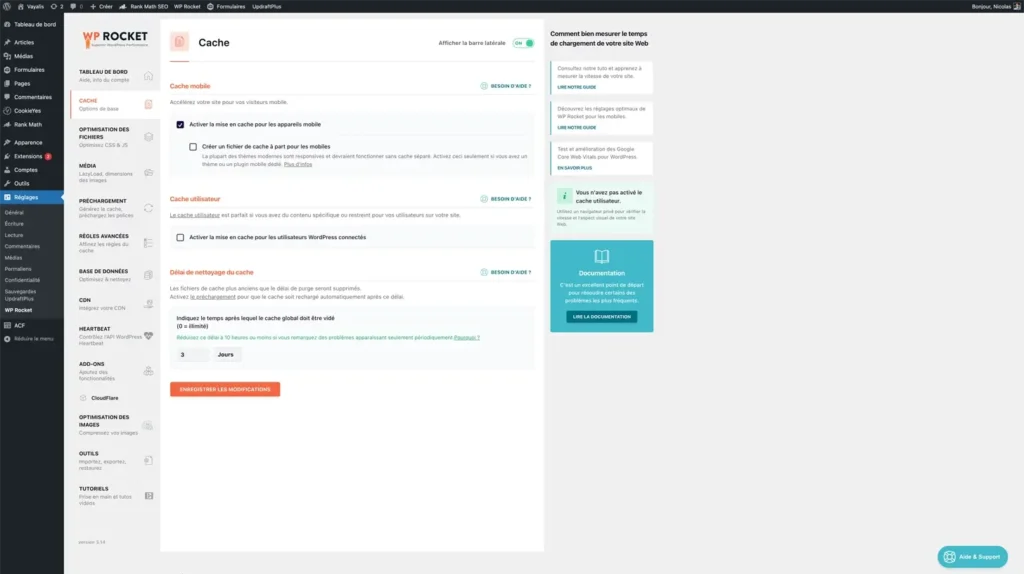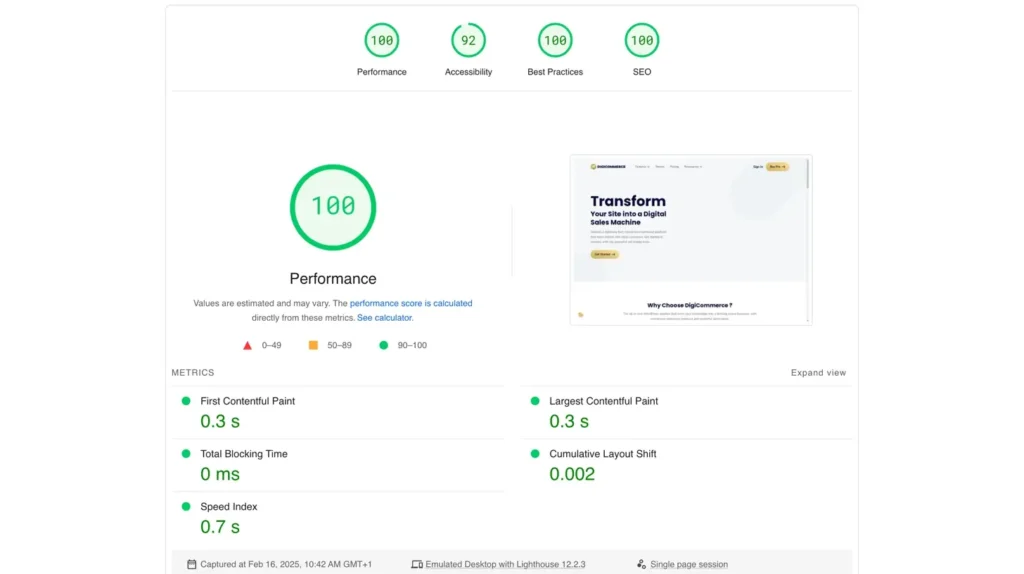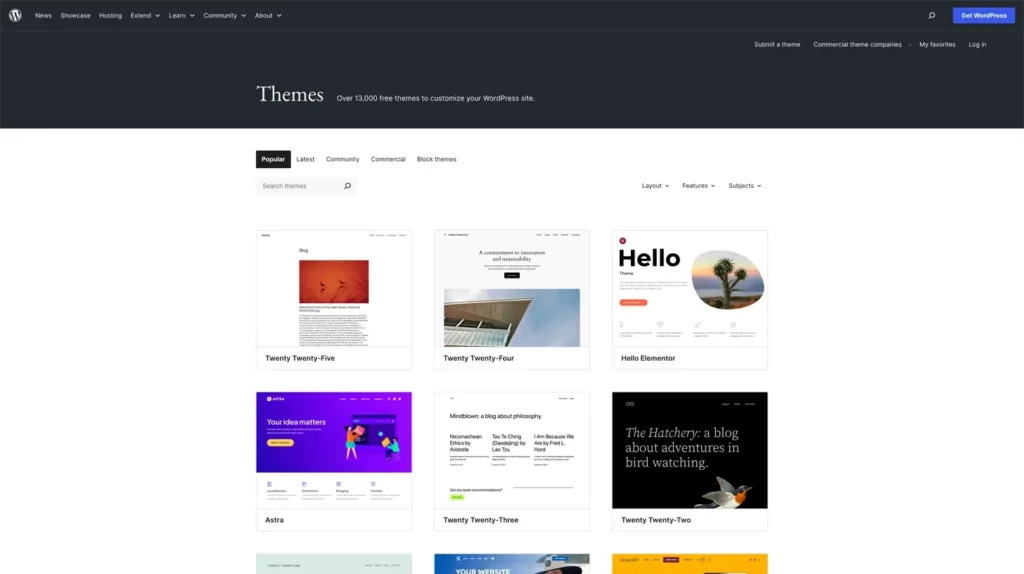You are tired of your WordPress site that is rowing? To see your visitors leave before they even say “WordPress”? I understand you, WordPress loading speed is a subject that is particularly close to my heart, and for cause: a slow site is like a store with an endless queue in front of the checkout. Customers leave in frustration.
In my job as a web developer, I often saw WordPress sites that could be real rockets, but they crawl like snails. The worst? Most of the time, a few simple optimizations would be enough to optimize your site speed. According to Google’s studies, 53% of visitors leave a mobile site that takes more than 3 seconds to load. That is to say, with a slow site, you literally throw your traffic out the window.
But don’t worry, I’m not here to scare you. On the contrary! I will share with you 8 proven and simple techniques to optimize the speed of your WordPress site. Solutions that I apply with amazing results. And the best in all of this? You don’t need to be a programming genius to set them up.
Choose a Quality Hosting Provider

The choice of hosting is fundamental for WordPress loading speed. The performance of your site depends directly on the available server resources: CPU, RAM, storage type and server configuration.
In the case of low-end shared hosting, you share these resources with hundreds of other sites. Result? Server response times that can exceed 1 second, while the ideal is below 200ms.
The following are the different hosting options, classified by performance:
Shared hosting :
- Suitable for sites with little traffic
- Resources shared with other sites
- Performance varies according to time and load
- Limited server configuration
- Good starting point for small budgets
VPS (Virtual Private Server) :
- Guaranteed and dedicated resources
- Better isolation from other customers
- Customizable server configuration
- Ideal for medium to large sites
- Excellent price/quality ratio
Dedicated Server :
- Maximum performance
- Full control of configuration
- 100% dedicated resources
- Suitable for large e-commerce sites
- Requires technical skills
The essential criteria for choosing your host :
- Automatic backups included
- Servers located in your country for better latency
- Responsive and competent technical support
- Modern infrastructure (SSD, recent PHP, nginx)
- Bandwidth guaranteed
- Availability rate > 99.9%
Hosting benchmarks (tests performed on a standard WordPress site) :
Shared hosting :
- Average response time: 800ms – 1.5s
- Time to first byte: 500ms
- Peak load: degraded performance
Optimized VPS :
- Average response time: 200-400ms
- Time to first byte: 100ms
- Stable performance even under load
Dedicated server :
- Average response time: 100-200ms
- Time to first byte: 50ms
- Consistent performance
Recommended server configurations :
PHP-FPM :
- memory_limit = 256M
- max_execution_time = 300
- max_input_vars = 3000
- upload_max_filesize = 64M
- post_max_size = 64M
- opcache.enable = 1
- opcache.memory_consumption = 256
MariaDB vs MySQL :
MariaDB :
- Better read performance (15-20% faster)
- Support of the latest optimizations
- Improved memory management
MySQL :
- More stable
- Extended support
- Best performance in writing on large volumes
Recommended hosts :
Hostinger :
✓ Very attractive prices
✓ Modern user interface
✓ One-click WordPress installation
✓ Solid performance
✓ Multilingual 24/7 support
✓ Free SSL and CDN
✓ WordPress staging environment
Bluehost :
✓ Official WordPress.org recommended host
✓ One-click WordPress installation
✓ Free domain for first year
✓ 24/7 expert support
✓ Automatic WordPress updates
SiteGround :
✓ Exceptional speed optimization
✓ Advanced security features
✓ Free SSL and CDN
✓ Daily automatic backups
✓ WordPress staging environment
✓ Premium WordPress migration tool
✓ Expert WordPress-specific support
If you feel the need to change hosting providers, feel free to check the migration article to easily switch from your current host to your new one.
Install a Powerful Cache Plugin

The cache is a crucial element of WordPress optimization. Without a cache, WordPress must run dozens of PHP and MySQL queries each time it generates a page. The cache allows to store the final result and serve it directly to subsequent visitors.
WP Rocket is our #1 choice for several reasons:
Advanced configuration:
- Full page cache with configurable duration
- Intelligent preloading of pages
- Cache database queries
- CSS/JS Minification and Concatenation
- Google font optimization
- Defer JavaScript
- Optimized browser cache
The essential settings to configure:
- Enable the mobile cache
- Configure exclusions (shopping cart, user account)
- Enable gzip precompression
- Optimize browser cache (expire headers)
- Set up lazy loading
- Enable minification with care
Free alternatives :
- WP Fastest Cache: The best free cache plugin
- WP Super Cache: Simple but effective
- LiteSpeed Cache: Great if your host uses LiteSpeed
- W3 Total Cache: Very complete but complex and has become a gas plant for your site
Small comparison of 4 big cache plugins and why I recommend WP Rocket:
| Feature | WP Rocket | WP Fastest Cache | WP Super Cache | W3 Total Cache |
|---|---|---|---|---|
| FeaturePrice | WP Rocket$59/year | WP Fastest CacheFreemium | WP Super CacheFree | W3 Total CacheFreemium |
| FeatureEasy configuration | WP Rocket | WP Fastest Cache | WP Super Cache | W3 Total Cache |
| FeatureDesktop Cache | WP Rocket | WP Fastest Cache | WP Super Cache | W3 Total Cache |
| FeatureMobile Cache | WP Rocket | WP Fastest Cache | WP Super Cache | W3 Total Cache |
| FeatureDatabase Cache | WP Rocket | WP Fastest Cache | WP Super Cache | W3 Total Cache |
| FeatureMinify CSS | WP Rocket | WP Fastest Cache | WP Super Cache | W3 Total Cache |
| FeatureCombine CSS | WP Rocket | WP Fastest Cache | WP Super Cache | W3 Total Cache |
| FeatureMinify JS | WP Rocket | WP Fastest Cache | WP Super Cache | W3 Total Cache |
| FeatureCombine JS | WP Rocket | WP Fastest Cache | WP Super Cache | W3 Total Cache |
| FeatureLazy loading | WP Rocket | WP Fastest Cache | WP Super Cache | W3 Total Cache |
| FeatureGZIP | WP Rocket | WP Fastest Cache | WP Super Cache | W3 Total Cache |
| FeatureBrowser Caching | WP Rocket | WP Fastest Cache | WP Super Cache | W3 Total Cache |
| FeatureSupport | WP RocketPremium | WP Fastest CacheCommunity | WP Super CacheCommunity | W3 Total CacheCommunity |
Optimize your images

The optimization of images is a major lever for WordPress loading speed. Studies show that images represent on average 50% of the total weight of a web page. Efficient optimization can reduce this weight by 40 to 80% without any visible loss of quality.
Optimization before upload :
- Dimensions adapted to the use (do not upload images of 4000px)
- Removing unnecessary metadata (EXIF data)
- Compression with dedicated tools
- Choosing the right format for the image type
Recommended formats according to usage :
- WebP: Modern format supported by 95% of browsers
- SVG: Vector logos and icons
- JPEG: Photos and images with lots of colors
- PNG: Images with transparency or few colors
Recommended optimization tools :
Automatic :
- Imagify ($0,009/image)
- ShortPixel (around $0,08/image)
- EWWW Image Optimizer (free)
Manual :
- TinyPNG (free)
- Squoosh.app (free, great for WebP)
- ImageOptim (free, Mac only)
Advanced configuration :
- Lazy loading native or via WP Rocket
- Setting up srcset for responsive
- Using a CDN for images
- Compression on the fly via nginx
Clean your Database

A well-maintained database is essential to maintain good performance. Over time, WordPress accumulates data that can significantly slow down queries.
Tables to clean regularly:
wp_posts Table :
- Article revisions (limit to 5 maximum)
- Abandoned draft articles
- Articles in the trash
wp_postmeta Table :
- Orphan metadata
- Data from uninstalled plugins
wp_options Table :
- Uninstalled plugin options
- Expired transients
wp_comments Table :
- Spam comments
- Pending comments old
Secure cleaning procedure :
- Perform a full backup
- Use WP-Optimize or Adminer
- Analyze the tables one by one
- Repair and optimize tables
- Check integrity after cleaning
Automated maintenance :
// Limit revisions
define('WP_POST_REVISIONS', 5);
// Empty the trash after 15 days
define('EMPTY_TRASH_DAYS', 15);
// Transients Expiration
define('TRANSIENT_TIMEOUT', 86400);Minimize HTTP Requests

The number of HTTP requests has a direct impact on WordPress load speed. Each CSS, JavaScript, image or external font file requires a separate connection to the server. Tests show that a 50% reduction in queries can improve loading times by up to 30%.
Query reduction strategies:
CSS files :
- Combine multiple style sheets
- Inline critical CSS
- Remove unused styles
- Load non-critical CSS asynchronously
JavaScript :
- Group scripts
- Delay loading (defer/async)
- Load only on the necessary pages
- Disable unnecessary scripts per page
Good practices :
1. Audit regularly with :
- Chrome DevTools
- GTmetrix
- WebPageTest
2. Identify problematic scripts :
- Poorly optimized WordPress plugins
- External social widgets
- Analytics and tracking tools
- Ad scripts
3. Technical solutions :
- Use HTTP/2
- Enable GZIP compression
- Set up a good browser cache
Use a CDN (Content Delivery Network)

A CDN is crucial for WordPress performance, especially for sites with an international audience. The data shows an average 50% improvement in load time for remote visitors from your main server.
Types of CDN available :
CDN Pull (the simplest) :
- Automatic configuration
- Passive synchronization
- Example: Cloudflare
- Ideal for small sites
CDN Push (more efficient) :
Price :
- Cloudflare (Free or $20/month)
- BunnyCDN ($0.01/GB)
- KeyCDN ($0.04/GB)
Optimize your WordPress Theme

The architecture of your WordPress theme is crucial for the performance of your site. A poorly designed theme can multiply by three your loading times, regardless of the quality of your hosting.
Criteria for assessing a theme:
Technical structure:
- Total file weight < 2MB
- Number of requests < 50
- Initial render time < 1.5s
- Core Web Vitals Score > 90
Critical points to check :
- Modular architecture
- Conditional loading of resources
- Support for the latest PHP versions
- Native image optimization
- Gutenberg compatibility
Good development practices :
// Load scripts correctly
wp_enqueue_script('my-script', 'path', array(), '1.0', true);
// Load styles in an optimized way
wp_enqueue_style('my-style', 'path', array(), '1.0', 'all');
// Disable WordPress emoji
remove_action('wp_head', 'print_emoji_detection_script', 7);
remove_action('wp_print_styles', 'print_emoji_styles');Keep your website up to date
Regular maintenance is essential to maintain optimal WordPress performance. An unmaintained site can lose up to 30% of its performance in one year.
Complete maintenance plan:
Weekly updates:
- Core WordPress
- Plugins and themes
- PHP and MySQL
- SSL and security
Monthly maintenance :
1. Performance :
- Speed tests
- Log analysis
- Database optimization
- Cache check
2. Security :
- Scan malware
- Access Check
- Audit of users
- Permissions control
3. Backups :
- Check for backups
- Restoration test
- Rotation of archives
- External storage
Common mistakes to avoid
Mistake #1: Too many optimization plugins
Impact: Conflicts, server overload
Solution: Maximum 2-3 essential plugins
Mistake #2: Cache configuration is incorrect
Impact: Invalid cache, display issues
Solution: In-depth test on staging environment
Mistake #3: Images not optimized before upload
Impact: Server overload, slow
Solution: Systematic optimization process
Mistake #4: Theme too heavy
Impact: Code blocked, performance reduced
Solution: Custom theme or light theme
Mistake #5: No performance tracking
Impact: Invisible progressive degradation
Solution: Monthly monitoring with appropriate tools
Conclusion
Optimizing the speed of your WordPress site is not just an option, it’s an absolute necessity in a web where every millisecond counts. The data is clear: a 0.1 second speed improvement can increase your conversions by 8%, while a slow site can drop your traffic by 50%.
Frequently Asked Questions
What is the real impact of speed on SEO?
Do I need to install all the optimization plugins available?
How do I know if my site is really slow?
- Google PageSpeed Insights for Core Web Vitals
- GTmetrix for detailed analysis
- WebPageTest for geolocated tests A score of less than 80/100 on these tools indicates a need for optimization.
I have a popular premium theme, is it enough to have a fast site?
How often should I optimize my WordPress site?
- Weekly performance check
- Monthly database optimization
- Quarterly full audit
- Annual infrastructure review



